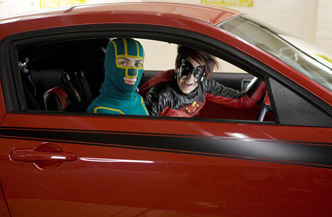|
|
Movie Review: Kick-AssBy Matthew HuntleyApril 19, 2010
Joining Kick-Ass is the dynamic duo of Big Daddy (Nicolas Cage) and Hit-Girl (Chloe Moretz), who deliver the movie’s funniest and most disturbingly inspired scenes. Big Daddy is a do-it-yourself version of Batman and Hit-Girl, his 11-year-old daughter, dons a purple wig and black mask. Together, they’re on a mission to bring down a local crime boss named Frank D’Amico (Mark Strong), whose son, Chris (Christopher Mintz-Plasse), has aspirations to take over the family business and become a superhero himself. The D’Amico father-son relationship is obviously meant to mirror Norman and Harry Osborn from Spider-Man, but it doesn’t necessarily have an attitude about it. That’s sort of what bothered me about Kick-Ass. It’s not as original or edgy as it promises to be and it doesn’t take a really fresh stance on its subject. For the most part, it’s standard superhero fare, with all the customary characteristics we’re used to, only they’ve been adult-ized and taken to a greater extreme. Dave, for instance, is more or less a different inflection of Peter Parker - he wears glasses, he’s skinny and he lacks the confidence to talk to girls (the only girl interested in him thinks he’s gay). The only thing separating Dave from Peter is he’s more R-rated, which means we see him masturbating and looking at porn on the Internet. This is funny but not that funny. What works better is Cage doing an Adam West impersonation by talking with undulation. The movie’s violence is also questionable. Like a lot of the movie, it exists on two different planes - on one, it’s gritty, realistic and illustrates how dangerous it could be to really try and be a superhero; on another, it’s gratuitous, over-the-top and fun. Most of this comes courtesy of Hit-Girl, who is not a force to be messed with. She can slit your throat, break your neck, stab you in the eye or stomp you on the face. The movie does a good job of choreographing her fight scenes and it’s difficult to know when Moretz has been replaced by a stunt double. But does the movie want to be realistic or fantastical? Not that it has to necessarily answer that question to be a good time - and it is - but I’m not sure director Matthew Vaughn really knew what he wanted to accomplish. I haven’t read Mark Millar and John Romita Jr.’s comic book series, but I’d be curious to know if it’s any clearer. Did Vaughn intend to make a farcical superhero movie or one that pays heed to the classic conventions of the genre? That confusion prevents Kick-Ass from really taking off. Scream worked because it was sharper and more focused - it knew it was a horror movie first and a hip, self-referential satire second. I enjoyed Kick-Ass, but it has mixed tones and its signals are not entirely lucid. For instance, will there or will there not be a sequel? The last shot of the movie suggests it’s either setting up for one or lampooning the very idea of setting up for one, all while referencing another movie. What does the movie really want to be? Like the characters of most superhero movies, that’s one of its internal struggles.
|

|
|
|

|
Thursday, October 31, 2024
© 2024 Box Office Prophets, a division of One Of Us, Inc.


